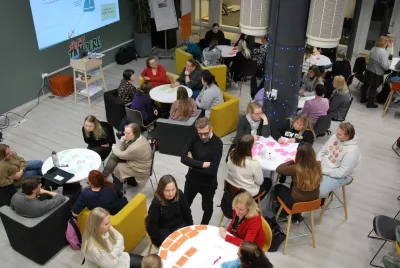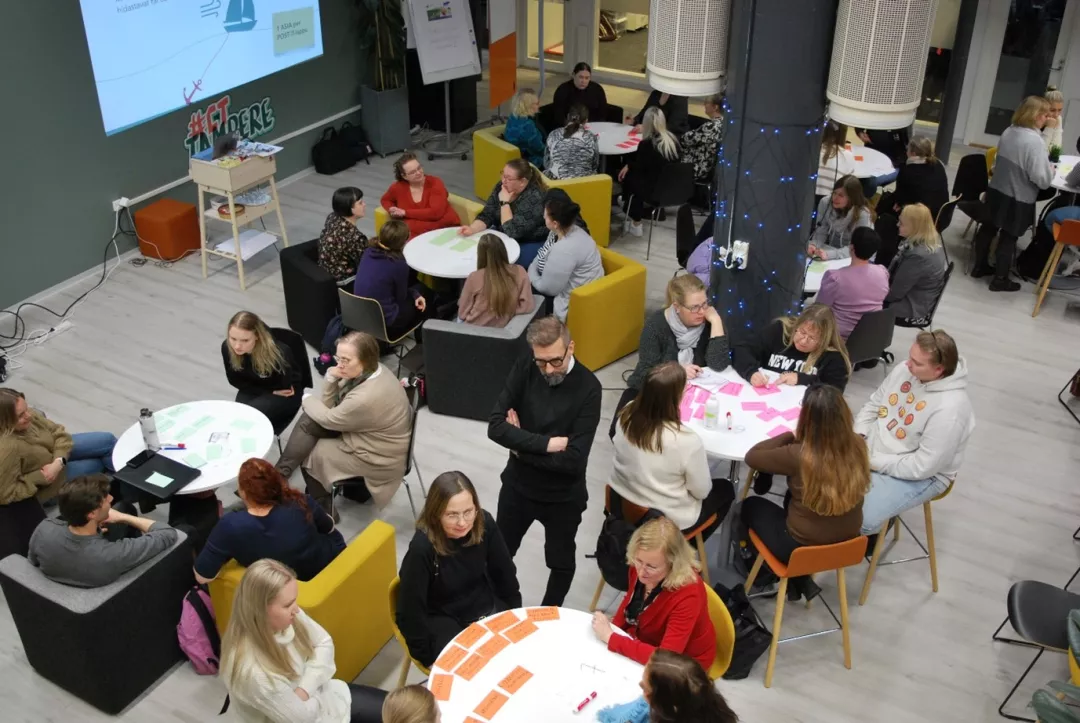Summary
In 2023, Finland's comprehensive healthcare reform shifted responsibility from 309 municipalities to 22 larger entities. Concerns about the accessibility of those services in rural areas increased.
Starting in September 2021, this project explored new models that could enhance access to social and health services, such as mobile or on-wheels methods to supplement in-person services in the rural region of Pirkanmaa, Finland.
Interviewing different actors and enabling dialogue and encounters such as service design workshops, the project assisted health and social service providers in discovering novel, resilient and adaptable approaches to delivering services in rural areas.
Results
The project results showed that various alternative locations are possible for rural health services, extending beyond the central health centre.
Options include services delivered in individuals' homes or based in village buildings (often owned by local NGOs with municipal support) and the use of existing facilities and mobile health service units. Effective multidisciplinary collaboration and robust technological support were consistently identified as essential prerequisites in all these scenarios.
The adoption of village buildings demonstrated significant benefits for local communities, particularly when local businesses play an active role in providing additional services like transportation and meals.
Furthermore, a project study emphasised the integration of knowledge about the rural area on aspects such as living conditions, road infrastructure, service availability or gaps with local businesses in the planning and implementation of these services.
The study introduces the concept of 'social and health service navigators' as a new professional role to coordinate services while maintaining an in-depth understanding of local needs and circumstances.

Promoter
Tampere University of Applied Sciences
Funding
European Regional Development Fund (ERDF), REACT-EU
Resources
Mobile social and health services to advance digitalisation in rural areas of the Pirkanmaa region, Finland
(PDF – 389.08 Ko)
Context
In January 2023, the Finnish government concluded its most extensive social and healthcare reform. The overarching objectives of this reform were to fortify the financial foundation of service provision, ensure equitable access to health and social services, and diminish disparities in health and well-being. However, there were concerns about services in rural areas, as these regions are grappling with declining and ageing populations, while services are increasingly concentrated in urban areas. To address this challenge, innovative service models and organisational methods are essential. In this context, the project sought to maximise the use of mobile social and health services operating on wheels. These can act as a supplementary resource to both in-person and digital services, particularly in areas with reduced access to health centres.
The successful operation of mobile health services depends on the use of digital services, technology, remote diagnostic tools and the seamless collaboration of all stakeholders (public, private and NGOs). The on-wheels and online services must be intricately coordinated within a system underpinned by dependable knowledge. Furthermore, the project explored various technical solutions extensively, delved into the repurposing of existing real estate and mobile units (including ambulances and security vehicles), and considered diverse financial and logistical aspects, including vehicle construction and ownership.
Objectives
The initiative's main goal was to promote collaboration among service providers, health technology companies and end-user customers to identify and explore the potential of developing innovative service models, such as mobile social and health services, in the rural region of Pirkanmaa, Finland, to improve their accessibility. The objectives were to gain insights into service needs, explore different service models, evaluate economic and ecological sustainability, and understand the potential added value of mobile services.
Activities, key actors, and timeline
The project started in September 2021, holding interviews with approximately 30 people representing various stakeholders, including public service providers, health technology companies, automotive specialists, village activists, and health and social work NGOs. The interviews revealed several significant findings. It underscored the importance of well-coordinated services and highlighted their interdependence. It also prompted a consideration of the financial implications associated with the transition from conventional health and social real estate to mobile units, with salary costs emerging as the predominant expense.
To ensure comprehensive participation and representation of diverse voices, a steering committee was established. Subsequently, dialogues were initiated with health workers. Furthermore, a seminar held in Väärinmaja village gathered roughly 35 participants from the local area, spanning service providers, e-health firms and various NGOs. This event served as a platform for presenting the project's ideas and enabling participants to become acquainted with mobile services and e-health technologies, benefitting from insights provided by field experts.
A service design workshop was also organised, engaging approximately 40 health professionals and students, who shared their perspectives and ideas, thus reinforcing the project's findings.
The rural communities involved in the project exhibited readiness and enthusiasm for exploring innovative solutions. The project included aspects such as assessing service needs, addressing logistics, implementing technological solutions, ensuring financial sustainability, managing ownership and maintenance of mobile platforms, exploring duplicability, and facilitating commercialisation of the models developed. It aimed to offer alternative concepts for implementing mobile social and health services that could support decision-making for service providers in the Pirkanmaa region.
Success factors/Lessons learnt
The project findings underscore the need for new work methodologies and environments, which in turn require updated job descriptions for health and social professionals. In these emerging models, professionals work more independently and rely on technology for support, with medical practitioners and other experts providing assistance from a virtual back office. This shift in practices necessitates a renewed approach to professional training. While addressing the logistical and technological aspects of mobile health units appears relatively straightforward, the results highlighted the substantial challenge of establishing and sustaining innovative forms of collaboration and service delivery. Consequently, the project recommends rigorous testing and piloting of these innovative concepts to ensure their practical viability.
Contact Information
Elina Harju, elina.harju@tuni.fi
